Harriet Benson Memorial Hospital
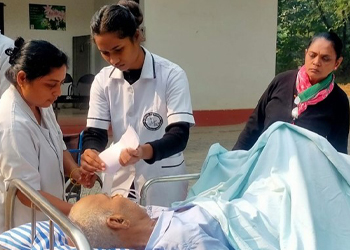
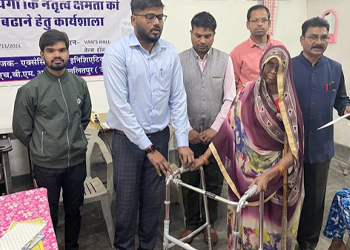
The struggle has been real over the last several years for the staff at Harriet Benson Memorial Hospital (HBMH). Without an OB/GYN to deliver babies and bring in a steady stream of patients and income, HBMH has had a hard time making ends meet. Currently they are without any doctors, but they are working with a local OB/GYN who comes in to care for pregnant mothers and handle their deliveries.
Several EHA hospitals have loaned staff to HBMH off and on, and they are expecting a new junior doctor soon. They have also been holding eye camps with an eye surgeon from another facility. With a faithful staff of just 35 including nurses, technicians, and administrative staff, they care for the patients who come. They have just 7 nurses—5 work at the hospital and 2 are part of the palliative care team that goes out into the communities.
Their community health and development program has two areas of service—disability services and palliative care. The disability support program has reached 11 villages, started 12 disabled persons’ groups, and helped 165 individuals over the last year. The HBMH staff help people fill out paperwork to obtain a disability certificate—which are notoriously difficult to get. They work with governmental and non-governmental organizations to distribute free assistive devices to those who need them. The staff also hold awareness campaigns to help break the social stigma of disabilities so that they are no longer seen as a curse.
HBMH’s palliative care (PC) program has been serving the needs of those with life-limiting illnesses since 2010, and is EHA’s oldest PC program. Each day, 2 nurses and other staff are driven out into the communities to visit the homes of the palliative care patients. They provide medical care, pain management, education for families in how to care for patients, and emotional support. Currently, they are caring for 82 patients in the villages surrounding Lalitpur.
Each of these community programs requires outside funding from grants, organizations, or individuals. If you would like to help meet the needs of these programs or the hospital itself, please click the button below.
Bringing Hope to the Villages
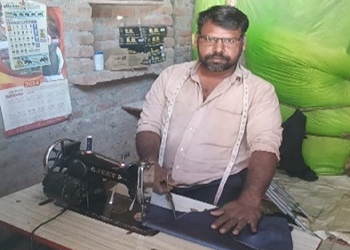
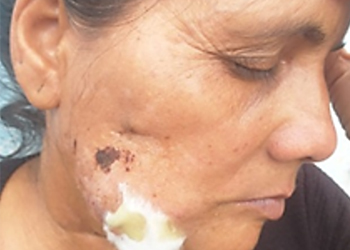
Manohar was born with a disability, and by adulthood, he was struggling to get around on an artificial leg. When HBMH’s disability services team heard about Manohar, they were quick to connect him with an organization offering free electric tricycles to those with mobility difficulties. Now Manohar has no trouble getting where he needs to go, including his tailoring shop. HBMH has helped to increase his ability to make a living and to restore his dignity.
At 54, Usha was dealing with excruciating wounds from oral cancer. She had tried multiple treatments and costly but ineffective medications and was without hope. When HBMH’s palliative care team found out about Usha’s situation, they were quick to visit her. By providing a pain patch and other affordable, effective medicine, they were able to significantly reduce her pain. Usha’s quality of life and hope for the future were both improved by the compassionate care of HBMH’s PC team.
Untapped Potential
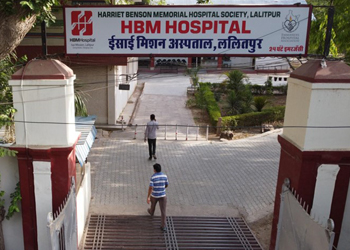
EHA’s Lalitpur Hospital, Harriet Benson Memorial (HBMH), is a glowing example of the deep commitment EHA personnel bring to their work. Desperately short of staff at all levels, the team still manages to serve more than 10,000 patients each year. More importantly, with additional personnel and financial resources, the hospital has great potential for wide impact in the Lalitpur community. As an indication of the hospital’s extensive influence, it is believed that about 80 percent of the people who live in Lalitpur were born at HBMH.
Much of their income currently comes from lab services performed (9,000 annually) and ultrasounds provided (1,600-2,300 annually), and they recently began offering cancer screening for women. Because they currently have no OB/GYN, they are not allowed to deliver babies, which would be a consistent source of income for them.
They have a fully equipped audiology department but need an audiologist. They have the facilities for eye surgery, but have had to rely on outside surgeons to come in and operate for their eye camps. They run a number of community outreach programs including eye screening, orthopedic camps, general health camps, and health/demographic surveys. Their palliative care team conducts 800 home visits each year.
The HBMH staff have been able to complete a number of facility improvements in the last several years, including paving the courtyard, installing a diesel generator and an oxygen generation plant, and upgrading the wards with new beds that each have oxygen piped to them.
The biggest challenge currently facing HBMH is low patient numbers, which has caused them to fall five months behind on salaries for all staff. There are actually people called touts who stand at the entrance to HBMH and tell people to go to the local government hospital across the street instead—in spite of the fact that the government hospital would likely charge more than patients can afford. There is a great need for more medical staff at the hospital which would open up the services they are able to offer. And there are a number of facility improvements needed as well as equipment that should be updated.
There is great potential at HBMH, and your support would go a long way toward meeting these needs. Thank you for your generosity.
Bringing a Smile
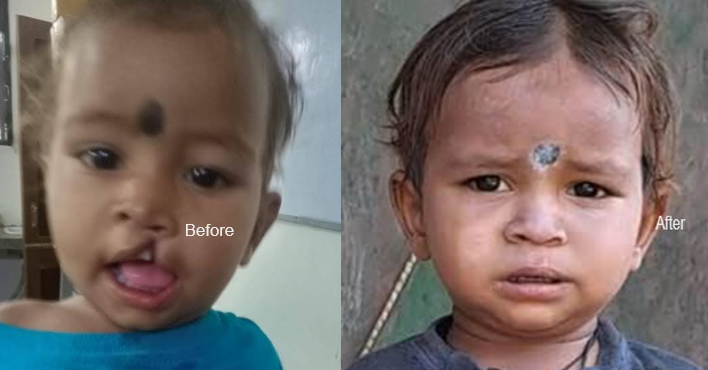
The couple had anxiously awaited the birth of their child, and they were thrilled when they saw it was a son. But when they gazed into his tiny face, they grew alarmed. They could see that his upper lip was split, and they did not understand what was wrong. The government doctors explained his condition, but when the parents heard the words “cleft lip and palate,” their dismay only grew. The couple was embarrassed by his deformity, and their son would not even be able to smile.
The parents were also afraid they would need to spend their life savings on surgery at a specialized hospital. But at the boy’s one-year medical visit, their pediatrician recommended the local missionary hospital. Finally feeling some hope for their son’s future, the couple approached the doctors at Harriet Benson Memorial Hospital. The mother’s question wrung the doctors’ hearts—“Will my child ever be able to smile?” Clasping her hands, the doctors assured her that he would, and that they would be charged only what they could afford. Still somewhat doubtful, the parents agreed to the recommended surgery.
The doctors examined the child, and surgery to repair his cleft lip was scheduled for the following day. The procedure went smoothly with no complications. Today the scar is almost invisible and the boy’s smile has bloomed. Smiles have also returned for his parents and community members who are so pleased with the care he received. The boy will require a second surgery in six months to repair his palate, but the parents have no fear, and the thought of this final procedure and the results it will provide brings a smile to the entire HBMH staff.
Water Project Provides Food and Jobs
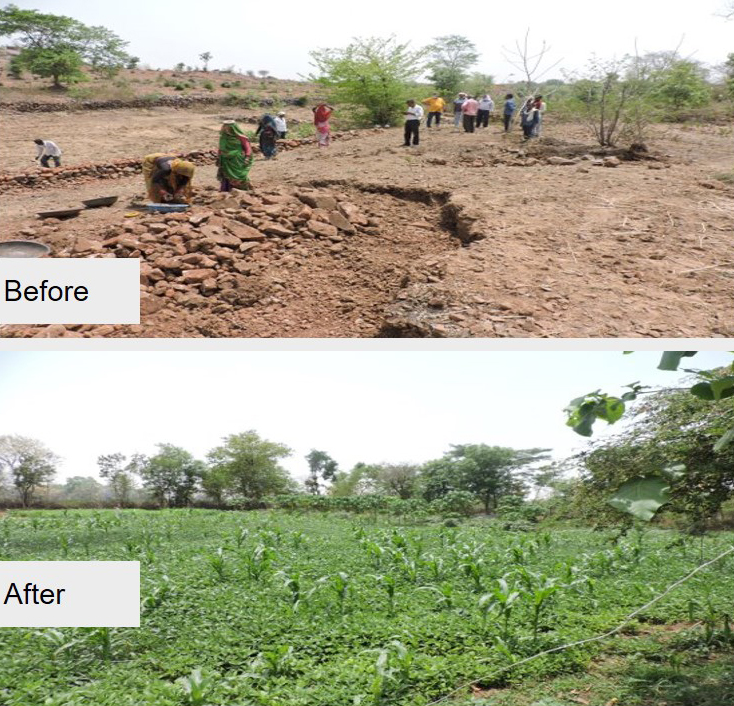
One of HBMH’s community development programs is the Baar Watershed Program. The initial project addressed an area of 15 villages encompassing 200 acres of land that was not arable. The dry land did not produce enough food to feed the people, and the men could not find enough work to support their families, so most of them traveled to cities to live and work.
Through the efforts of the program, 92 acres of land are now richly producing crops, thanks to improved water retention and irrigation, as well as better agricultural techniques. About 150 families now have improved food security due to these efforts, and the percentage of men migrating to work in cities has been reduced by a whopping 92 percent. Projects like this one make a tremendous difference in educating villagers and improving their life situation.
Significant Needs at HBMH
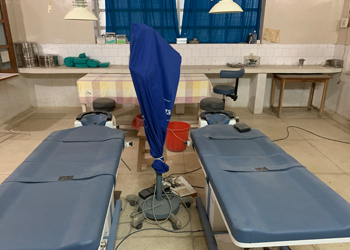
Until HBMH gets some surgical, obstetric, and orthopedic equipment, they will be limited in the services they can offer. With three specialists now on staff, it is a waste of their skills not to have the tools they need. Their biggest needs are listed below:
$14,000 Ventilator (need several)
$6,300 Surgical instruments
$4,700 Orthopedic drill and saw
$3,900 ICU monitor (need several)
$2,350 Operating room lights
$785 Obstetric vacuum kit
$785 Syringe pump (need several)
$470 Infusion pump (need several)
If you feel led to help HBMH purchase this needed equipment, click the button below and choose a piece of equipment for HBMH in the drop-down menu.
Turnaround at Harriet Benson Memorial Hospital
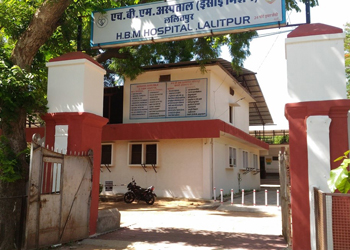
In the past, Harriet Benson Memorial Hospital (HBMH) was known for safe deliveries, eye surgery, palliative care, and community-based projects throughout the district. But in recent years, HBMH almost closed its doors. With minimal staff and a single doctor, the hospital’s bed occupancy fell to less than three percent. The once busy ophthalmology department stood empty, and deliveries and pediatric care were halted due to a lack of specialists required by the government.
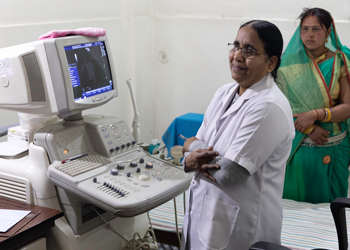
At the end of 2019, HBMH received a huge blessing when Dr. Rachel Kumar came to take over the obstetrics department. Early in 2020 the arrival of husband-and-wife team Dr. Thomas Kurien Bhanu, orthopedic surgeon, and Dr. Madhurita Singh, anesthetist specializing in critical care (pictured below with their daughter), strengthened the hospital’s services. With the arrival of an intensive care specialist, the High Dependency Unit (similar to an ER) is ready to be put to use, while needing updated equipment and additional trained staff.
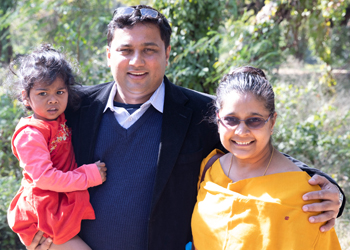
The staff of HBMH are excited for the possibilities and are praying for needed equipment and more staff to bring the hospital back to full functioning. They need monitors, ventilators, and surgical/orthopedic instruments and equipment. If you feel led to donate to these needs, please click the button above and choose HBMH in the drop-down list on the donation page.
Experiencing COVID-19 Effects at HBMH
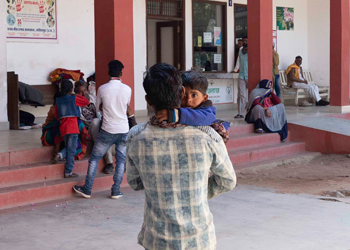
Since most of the hospitals in the Lalitpur area (in central India) are currently closed, Harriet Benson Memorial Hospital (HBMH) staff have been unexpectedly busy. For the last several weeks, they have been averaging 2 or 3 caesareans each day, often at night, giving little rest to the surgical staff, Dr. Madhurita (the anesthetist), and Dr. Rachel (the obstetrician). Many other types of patients are showing up at HBMH’s door for medical care since there is nowhere else to go. While they are very thankful for the increased income that additional patients bring, it is difficult for their limited staff to keep up.
Until a few weeks ago, they had only had one COVID-19 case in their area, but now they are experiencing a spike of over 100 cases and 3 deaths. It is easy to feel that the situation is out of control and that they are more at risk than ever, but they ask for prayer that the situation would simmer down.
The leadership at HBMH are grateful that two staff and a junior doctor who were stuck elsewhere when the lockdown was put into place have been able to return. So far, none of their staff have been infected with COVID-19. They are also thankful to Daniel Hendrix, a US audiologist, who was visiting in March and who has stayed to help set up an audiology department. As with most EHA hospitals, HBMH leadership need more staff in all areas. Another recent accomplishment was the setting up of an effluent water treatment plant required by the government to ensure they are releasing treated water back to the water table.
Widow Reaps a Golden Harvest
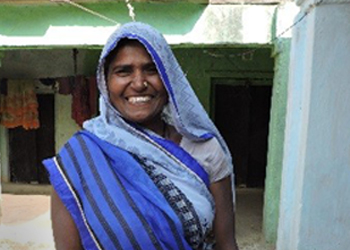
Mrs. Lelabai is a farmer who owns just an acre and a half of land. She must try and support her family on the crops she can raise because she lost her husband to stomach cancer in 2016 and now lives with her teenage son and married daughter.
Recently the Krishi Vigyan Kendra (KVK) program approached the community development project staff at Harriet Benson Memorial Hospital (HBMH) about setting up demo plots for sesame seed crops. Oil seed crops are desirable because they sell for a good price, don’t need fertilizer, and can be grown with little water and poor soil.
The village of Bheloni Suwa chose Mrs. Lelabai for the program, and she received 4 1/2 pounds of sesame seeds to cultivate. Amazingly, she raised 717 pounds of sesame seeds on her small plot. Even after keeping 55 pounds for planting next year’s crop, she still earned $325, an enormous profit for her little family.
What’s more, when the KVK program officials heard about her success, they recognized her by including her story in their report about the program, and she was publicly honored by a well-known agricultural scientist when he came to HBMH for their annual community project event.
Now other farmers from the village are being encouraged to adopt these same farming practices pioneered by Mrs. Lelabai. EHA’s community project staff are invaluable in connecting government programs and benefits to the individuals in the villages who really need the help.
Relief from Pain and Hope for the Future
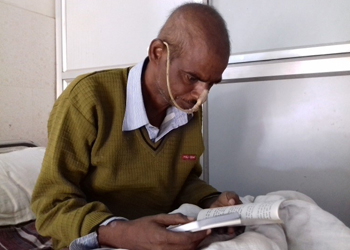
Thirty-eight-year-old Sita Ram Ahirwar lived just over a mile from Harriet Benson Memorial Hospital (HBMH) with his wife, Mamta, and their five children.
A poor man, he worked as a bus conductor commuting between Lalitpur and Jhansi. A year and a half ago, he developed severe abdominal pain. Sita visited the local doctors and was treated for acute inflammation of the stomach. But the relief was short lived. Referred to another hospital, he was finally diagnosed with stomach cancer. Unable to pay for medical treatment, he returned to Lalitpur.
Several HBMH volunteers knew of his plight and told the palliative care team about Sita. Visiting him at home, the team encouraged Sita to come to the hospital for pain management. He complied and his pain lessened; meanwhile, Sita and his family became very attached to the palliative care team.
Both the local pastor and the team shared the love of God with Sita. He began to pray and read the Good News. He died shortly thereafter, his pain alleviated and his heart at peace. At his funeral his family also received the Good News and began attending the local church. His wife now works in a Catholic school to support the children and their education. The whole team at HBMH was grateful to have a part in transforming the life of this family.
HBMH Bouncing Back from Lean Years
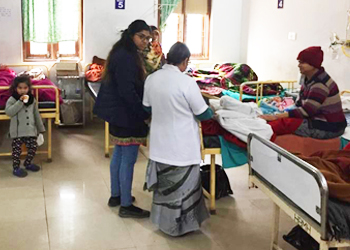
Built in 1932 as a small mission hospital, Harriet Benson Memorial Hospital (HBMH) grew to a 40-bed facility before being turned over to EHA in the 1970s. This growth continued until HBMH’s services were much sought-after by the people of the nearby communities. The hospital was known for safe deliveries, eye surgery, palliative care, and community-based projects throughout the district.
But in recent years, HBMH went through a rough season and many feared closure was imminent. Down to a threadbare staff and a single doctor, the hospital’s bed occupancy fell to less than three percent. The once well-equipped ophthalmology department with its own operating room and recovery wards stood empty. Deliveries and pediatric care had come to a standstill due to a lack of specialists.
But the local public still had faith in Harriet Benson Memorial Hospital. They knew this was no ordinary hospital, but one that cared for its patients with the love of God, and their trust was not broken.
At the end of 2019, HBMH received a shot in the arm with Dr. Rachel Kumar coming to take over the obstetrics department, and early in 2020 the arrival of husband-and-wife team Dr. Thomas Kurien Bhanu, orthopedic surgeon, and Dr. Madhurita Singh, anesthetist specializing in critical care, strengthened the hospital’s services. With the arrival of an intensive care specialist, the High Dependency Unit (similar to an ER) awaits a new beginning, needing updated equipment and additional trained staff.
The staff of HBMH are excited for the possibilities and are praying for new equipment and more staff to bring the hospital back to full functioning. They need monitors, ventilators, and surgical/orthopedic instruments and equipment. If you feel led to donate to this need, please click the button below and choose HBMH in the drop-down list on the donation page.
High Dependency Unit at HBMH
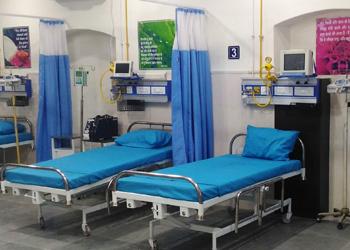
Harriet Benson Memorial Hospital (HBMH) is thrilled to have their High Dependency Unit up and functioning. In June of 2018, Dr. Lesley Ponraj joined the HBMH family as a long-desired Medicine Specialist. Soon after, the hospital received some “seed gifts” to help them begin construction of this emergency care unit.
After some further gifts from Mission Direct and other organizations came in, the construction was completed. EHA’s Lakhnadon Christian hospital loaned the new unit several pieces of needed equipment, including a ventilator, a defibrillator, an arterial blood gas machine, two monitors, and two syringe pumps.
In October the inauguration of the new unit was held, attended by senior government officials, non-governmental partners, and other practitioners from Lalitpur. Meetings such as this help to highlight the scope of the work done at EHA hospitals and to let local officials know that EHA partners with them in caring for the health of the people in the district.
Currently, HBMH is still struggling with low patient numbers in spite of this new facility equipped to deal with acutely ill patients. It is their hope that this new 6-bed high dependency unit will save lives and be a blessing to many in the community.
Saving Two Children in One Family
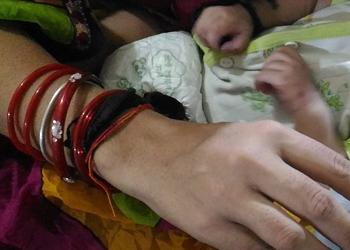
Reshmi brought her young son into Harriet Benson Memorial Hospital with a heavy heart. She had been told at another hospital that he likely had a terminal case of untreated tuberculosis. The doctor there said that he was too far gone and could only be treated if they gave him 100,000 rupees ($1,400), an exorbitant sum. When the family told him they could not pay, he told them to go to the “mission hospital.”
When the child came to them, the HBMH staff took him on as a challenge. The doctors and nurses treated the boy and stabilized him, and after collecting a fraction of what the other doctor demanded, they sent him home. God was good and the boy was saved.
Several months later, Reshmi came back to HBMH with another “problem.” She was pregnant with her fourth child and she wanted Dr. Sheba to “garbh saaf karo,” or clean out her womb. Medical termination of pregnancy is legal in India until the 20th week. An estimated 15.6 million abortions are carried out in India each year.
Knowing how valuable each life is, Dr. Sheba gently spoke with Reshmi about the small child being formed in her womb. Reshmi listened and decided that she would carry her child to delivery after all. The HBMH staff are thrilled that the little boy who was cured of tuberculosis will have a new little brother or sister soon.
On the Road to Recovery
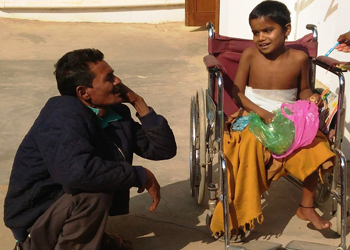
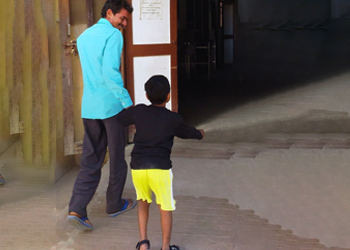
Suresh could not walk, speak, or hear properly when he was brought into EHA’s Harriet Benson Memorial Hospital. He had been through a horrific accident where he was dragged by a vehicle for some distance, losing much of the skin on his side and thigh. His parents brought him in, desperate for healing for their son. Thankfully, the man who had driven the vehicle in the accident agreed to pay for part of the medical treatment. Otherwise, the parents would have struggled to pay the hospital bills.
After much medical care, Suresh was stabilized and strengthened. As is sometimes the case, one EHA hospital will have a specialist that another one doesn’t have, so in this case, Suresh was sent with Dr. Sujith to Broadwell Christian Hospital for two skin grafts. Suresh’s healing was dramatic, and he is now able to walk. Please pray for this young boy and his parents as they continue to walk on the road to recovery.
Phase Two of Construction Begins
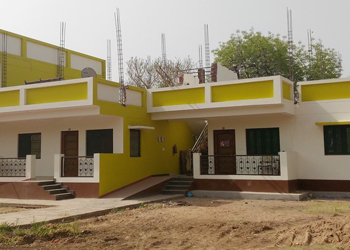
After a generous donation from Mission Direct in the UK, Harriet Benson Memorial Hospital has taken a step of faith to begin adding on two more apartments to the new Thyle Residency. This will bring the occupancy of this facility up to eight families.
The current goal is to lay the slab for the roof and get the walls up around the two new apartments before the rains come in mid June. The same construction team that built the original structure last year is working on the addition. Please pray for safety for the workers and for God to provide the additional funding needed to finish this addition.
Tiny Baby Boy Is Nurtured to Life
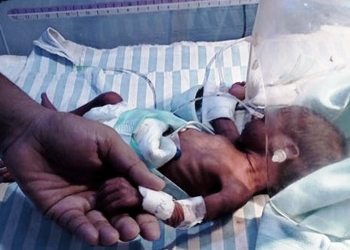
She was only seven and a half months pregnant, but her water had broken, she had developed a fever, and her labor pains had begun. Lalitha had first gone to the governmental district hospital, but they sent her away, saying she needed to go to a more advanced facility. She chose to come to EHA’s Harriet Benson Memorial Hospital. The couple seemed resigned to losing their baby and had given up hope. EHA’s medical team agreed to admit Lalitha, but they were not very optimistic about the baby’s chances.
Late that night, a 2-pound baby boy was born, and to everyone’s surprise, he let out a feeble cry. He was alive! He needed oxygen, warmth, fluids, medicine, and a lot of grace. As he stayed in the hospital, his bill continued to climb, and the relatives asked the hospital to release him since his chances were still bleak. But the hospital staff knew that if this tiny baby went home, he would die there, so they talked the couple into leaving the child at the hospital for continued care at no cost to them.
As the days passed, this little boy repeatedly fought for life. The entire medical team prayed and cared for him. At times he would give them a scare and stop breathing, but each time the faithful nurses and doctors would notice and rush to resuscitate him. The staff loved the baby and named him Ashish, which means “blessing” in Hindi.
So far, little Ashish has survived for a month, and he has gained strength and some weight. His parents have come to the hospital to hold him. He is still precariously delicate, but he is a constant reminder that God is working among us.
Bacon Memorial Training Center Opens
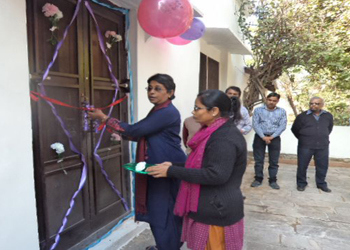
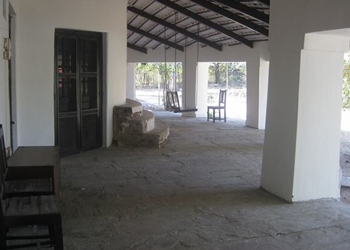
New facilities at EHA hospitals always make life easier for the staff. The newly renovated training center at Harriet Benson Memorial Hospital now provides a clean, modern environment for small groups, workshops, meetings, conferences, training programs, and retreats. The center houses a large conference room with an LED projector, several smaller meeting rooms, guestrooms, and a dining room.
Quite a few of the antique furnishings date back to the building’s use by Mrs. Elizabeth Mercy Bacon, who founded the hospital at the turn of the century.
Plans are underway to use the center for classes for the Certificate Program in Palliative Care offered by the Indian Association of Palliative Care, as well as various EHA training sessions.
The Blind Receive Sight
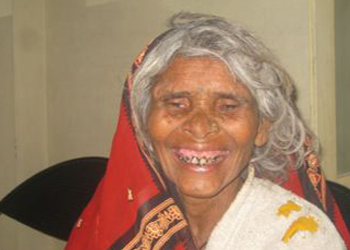
Pukhan, from Jakhaura village, had been blind in one eye for two years. Before cataract surgery, she could detect motion but not see anything clearly. At her follow-up visit a week after surgery, she laughed delightedly as she counted the fingers held up by Suresh, HBMH’s eye technician. Pukhan is one of thousands who struggle with varying degrees of blindness in India. Many suffer from cataracts and have no idea where to go for help or how to afford eye care. One study estimated that there are 15 to 18 million blind people in India.
HBMH has an eye department but no resident ophthalmologist. Suresh does refractions to test eyesight and fit people for glasses as well as check people in the out-patient department for other issues including cataracts. When there is a need for surgery for a number of people, a visiting ophthalmologist comes in for an eye camp. In a typical camp, an amazing 85 people have cataract removal surgery in one week. This life changing procedure brings joy and hope to many who have nowhere else to turn. And sometimes having their physical sight returned to them awakens in them a desire to hear about spiritual sight from the doctors and nurses who treat them in love.
Amazing Healing for 8-Year-Old Girl
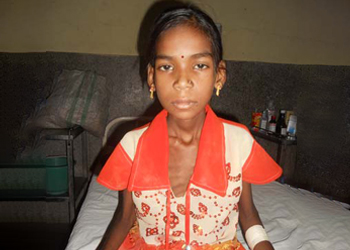
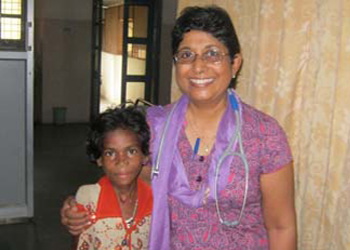
She came to the emergency room in the middle of the night suffering from fever, abdominal pain, and distention. Her relatives were encouraged to take her to a hospital with more advanced facilities, but they were unable to afford or handle such a journey. Since Mamta was only eight years old, the doctors at Harriet Benson were especially leery of operating on her, as they didn’t have a trained anesthesiologist. As her condition worsened, they prayed about what to do. Four days into her admission, an anesthesiologist visited the hospital, and they took advantage of this provision and scheduled surgery.
The surgeons opened her abdomen and discovered a perforation in her small intestine which had caused pus and fecal matter to fill her entire abdomen. Worse, tuberculosis had ravaged her intestines. Everyone felt her chances of survival were very low, and the surgeon exclaimed that her recovery would take a miracle.
Surprising everyone, Mamta survived the ordeal of major abdominal surgery and was soon on the path to recovery. Everyone felt this showed divine intervention. Then a setback occurred. Even while on anti-TB medications, the mycobacterium began to cause havoc again. She needed a drain to reduce the fluid in her abdomen as her body began to fight the bacterium. As the days progressed with dressings, antibiotics, and loving care combined with prayers, one miracle followed another and soon Mamta was ready to go home. After two months in the hospital, her subsidized bills were paid by World Vision. All of the staff felt that Mamta’s healing could only have been brought about by God through the faithful, healing hands at Harriet Benson Memorial Hospital.
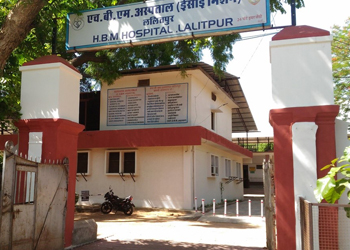
About Harriet Benson Memorial Hospital
In 1890 the Reformed Episcopal Mission of the United States sent Mrs. Elizabeth M. Bacon to Lalitpur to open a mission station attached to a small hospital and school. Regular medical work began in 1934 with a full-fledged hospital run by dedicated expatriate missionaries for the next four decades. In 1973 the mission turned the management of the hospital over to EHA. Currently, their service priorities include treating women and children, eyecare, and surgery. The hospital serves the Lalitpur district with a population of close to one million, 70 percent of whom live rurally.
Harriet Benson Memorial Hospital offers eye surgery camps in which hundreds of free cataract surgeries are performed each year. Thousands of children have their eyes screened as well. During the free plastic surgery camps, many cleft lips and cleft palates are corrected through surgery.
The hospital also has a palliative care program with a seven-bed ward. In this department they care for terminally ill patients, reducing their pain and helping patients and their families as they deal with illness and eventual death. Many of the patients have cancer, and many are cared for in their homes where they can be among family members as long as possible.
The Lalitpur Community Health and Development Project has several facets. Health camps are organized in various communities and information about personal hygiene, sanitation, and communicable diseases is taught. HIV/AIDS programs regarding stigmas, prevention, and gender sensitization bring about awareness in the communities. Self Help Groups teach members to save their income, become literate, and make use of government programs which benefit them. Eligible people are taught to claim disability certificates, widow certificates, and pensions. As the staff of Harriet Benson Memorial Hospital and the Lalitpur Project reach out to these people with medical care and practical assistance, the door is opened for them to share the good news of God with the lost.
